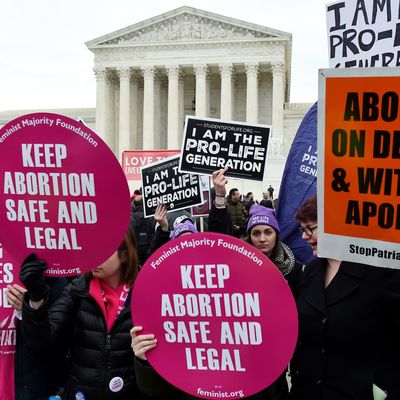
In perhaps the most consequential decision on abortion rights handed down since 1992, the U.S. Supreme Court has declared a Louisiana law imposing licensing restrictions on abortion clinics unconstitutional, with Chief Justice Roberts siding with the Court’s four traditionally pro-choice justices.
June Medical Services v. Russo was universally regarded as the best opportunity anti-abortion advocates had to give a green light to states that sought to shut down clinics via Targeted Regulation of Abortion Providers (TRAP) laws purported (disingenuously) to protect the health of women seeking abortions. What stood directly in the way, however, was the Supreme Court’s 2016 decision in Whole Woman’s Health v. Hellerstedt, in which it struck down a virtually identical Texas law. But the Court was configured differently four years ago. Since that 5-3 decision — the vacancy created by Justice Antonin Scalia’s death had not yet been filled — one of the majority in the case, Justice Anthony Kennedy, retired, and two new justices, Neil Gorsuch and Brett Kavanaugh, were nominated by Donald Trump, who has vowed to use his appointments to end abortion rights. So by simple arithmetic, it seemed like the Court would reverse or somehow distinguish Hellerstedt, so long as it could overcome the embarrassment of changing directions so quickly on the hottest constitutional issue of all.
But Chief Justice Roberts couldn’t bring himself to do that. In a concurring opinion (the majority opinion was written by Justice Stephen Breyer, who also wrote the opinion in Hellerstedt), Roberts, who dissented in Hellerstedt on procedural grounds, reiterated his position that the earlier case was wrongly decided, but insisted the Court was bound by precedent to respect it since the two laws in question in the two cases were virtually identical:
The Louisiana law imposes a burden on access to abortion just as severe as that imposed by the Texas law, for the same reasons. Therefore Louisiana’s law cannot stand under our precedents.
The four conservatives dissenting in this case were all but seething in their contempt for the simplicity of Roberts’s decision. Only one, Justice Clarence Thomas, long the justice most openly hostile toward reproductive rights, attacked the precedents going back to Roe v. Wade. The central dissenter, Justice Samuel Alito, mostly claimed the law didn’t really impose an “undue burden” on women seeking abortions, the standard set out in 1992’s Planned Parenthood v. Casey, the main precedent on abortion rights. In separate dissents, Neil Gorsuch emphasized the need to defer to state judgments about the benefits of TRAP laws, while Brett Kavanaugh accused the majority of failing to let the lower courts make factual determinations of the impact of the Louisiana law. All four dissenters claimed the clinics that challenged this law did not have standing to represent the women involved.
Perhaps because Roberts’s key vote was so clearly compelled by the nearly identical nature of the laws in question in the two SCOTUS cases, this decision could theoretically keep open the feasibility of some other kind of TRAP laws in the future. But it’s unlikely that Republican state legislatures can get another, stronger case before SCOTUS quickly enough to mitigate the impact of two consecutive decisions blocking TRAP laws. And if Roberts is unwilling to reverse Hellerstedt, he certainly cannot be expected to go further down the road to the reversal of Casey and Roe that the anti-abortion movement wants, and that nearly all Republican politicians in Washington and around the country support.
In the short term, June Medical Services will create fresh howls of outrage among conservatives at the perfidy of John Roberts, who in earlier 5-4 decisions saved Obamacare and struck down a citizenship question for the 2020 census. Roberts was also an accomplice of Neil Gorsuch (who wrote the majority opinion) in the Court’s 6-3 decision two weeks ago ruling that LGBTQ rights are protected by Title VII of the Civil Rights Act. And though there are several other big decisions pending at the very end of this Supreme Court term, it is shaping up as a huge disappointment to those whose support for Donald Trump in 2016 heavily depended on his promises to reshape the Court and constitutional law.
You can be sure Trump will tout this and similar decisions as proof he needs a second term to consummate the counterrevolution conservatives have long planned, with abortion rights remaining the first and principal target. But if Biden wins in November, the odds of Supreme Court approval of abortion restrictions anytime soon may have just receded over the horizon.






























